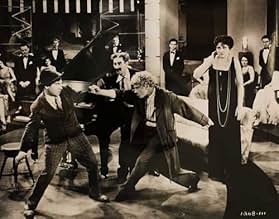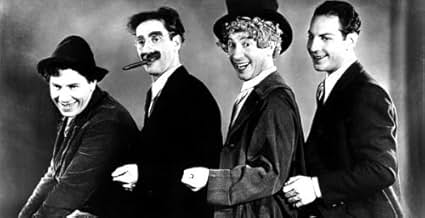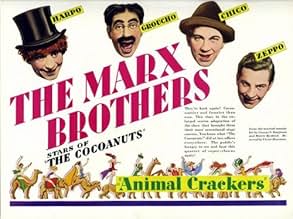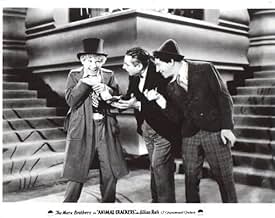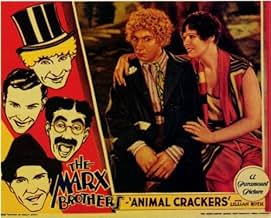Mayhem and zaniness ensue when a valuable painting goes missing during a party in honor of famed African explorer Captain Spaulding.Mayhem and zaniness ensue when a valuable painting goes missing during a party in honor of famed African explorer Captain Spaulding.Mayhem and zaniness ensue when a valuable painting goes missing during a party in honor of famed African explorer Captain Spaulding.
- Awards
- 2 nominations total
Groucho Marx
- Captain Geoffrey T. Spaulding
- (as The Marx Brothers)
Harpo Marx
- The Professor
- (as The Marx Brothers)
Chico Marx
- Signor Emanuel Ravelli
- (as The Marx Brothers)
Zeppo Marx
- Horatio Jamison
- (as The Marx Brothers)
Robert Allen
- Party Guest
- (uncredited)
Donald MacBride
- Party Guest
- (uncredited)
Ann Roth
- Party Guest
- (uncredited)
Featured reviews
For many years, ANIMAL CRACKERS was a "lost" film. Paramount owned the audio, and Universal owned the Visual elements (It may of been vice-versa) During the re-birth of Marx Brother popularity, ANIMAL CRACKERS mad it's way back into theatres in the Fall of 1974.
It was a thrill to see the movie in a theatre (the best place to see a classic comedy). The plot concerns a wild, out of control explorer's (Groucho Marx) visit to a Long Island estate. He comes across stuffy snobs and a questionable musician for hire (Chico Marx and his lunatic partner, Harpo.) Groucho's dialog is superb. His verbal assaults on stuffed shirts are priceless "It's not safe to ask this man a simple question" Groucho says to the audience when he talks to a pompous "art critic".
Chico and Harpo provide the more manic visual antics, especially when they steal the birth mark of above mentioned art critic. Even straight man Zeppo gets to be funny and silly.
The only real problem with the film is well voiced in critic's Richard Anobile's review "This is a RECORDING of a stage play. The camera barely moves. it just sits there and records the Marx Brothers" Still in all, see ANIMAL CRACKERS to enjoy the joy of Marx mayhem
It was a thrill to see the movie in a theatre (the best place to see a classic comedy). The plot concerns a wild, out of control explorer's (Groucho Marx) visit to a Long Island estate. He comes across stuffy snobs and a questionable musician for hire (Chico Marx and his lunatic partner, Harpo.) Groucho's dialog is superb. His verbal assaults on stuffed shirts are priceless "It's not safe to ask this man a simple question" Groucho says to the audience when he talks to a pompous "art critic".
Chico and Harpo provide the more manic visual antics, especially when they steal the birth mark of above mentioned art critic. Even straight man Zeppo gets to be funny and silly.
The only real problem with the film is well voiced in critic's Richard Anobile's review "This is a RECORDING of a stage play. The camera barely moves. it just sits there and records the Marx Brothers" Still in all, see ANIMAL CRACKERS to enjoy the joy of Marx mayhem
Once again, this Marx Brothers film is different from most comedies in that is features a mile-a-minute gags, either verbal or sight, constant silliness and some music thrown in the mix. All of it runs the gamut from very clever to stupid. However, if it gets stupid hang around another minute or so and you'll find something to laugh at.
One problem, especially with this film, is that some of the humor is dated and/or topical, meaning what was funny back then isn't necessarily now or the subject Groucho or Chico is talking about was big news back then but unknown now.
Nonetheless, I still enjoyed this and found a lot of funny material. I enjoy the Marx Brothers clever stuff and their slapstick. I particularly appreciated Groucho apparently ad-libbing one scene. In a few others he acted like he was ad- libbing, turning his head and talking to the camera. You don't see much of that stuff, and it's funny.
Two of the three songs were instrumentals, and they seemed to take away from the pace of the story. Groucho's song, "Hooray For Captain Spaulding," is a classic.
Some consider this to be the best Marx Brothers movie but I found several others I liked a lot more, such as "Horse Feathers" and "Duck Soup," just to name two.
One problem, especially with this film, is that some of the humor is dated and/or topical, meaning what was funny back then isn't necessarily now or the subject Groucho or Chico is talking about was big news back then but unknown now.
Nonetheless, I still enjoyed this and found a lot of funny material. I enjoy the Marx Brothers clever stuff and their slapstick. I particularly appreciated Groucho apparently ad-libbing one scene. In a few others he acted like he was ad- libbing, turning his head and talking to the camera. You don't see much of that stuff, and it's funny.
Two of the three songs were instrumentals, and they seemed to take away from the pace of the story. Groucho's song, "Hooray For Captain Spaulding," is a classic.
Some consider this to be the best Marx Brothers movie but I found several others I liked a lot more, such as "Horse Feathers" and "Duck Soup," just to name two.
Animal Crackers was the second of two Broadway shows that starred the Marx Brothers and was done at the Paramount Astoria Studios. After they went to Hollywood, with the exception of Room Service, all their material was original for the screen.
The Brothers were doing Animal Crackers on Broadway in 1928-1929 and it had a respectable run of 191 performances. In fact while they were doing Animal Crackers on stage, for a part of 1929 they were shooting The Cocoanuts at the Astoria Studios. Unlike The Cocoanuts, nearly the entire Broadway cast was used in the film, with the exception of the juveniles, Lillian Roth and Hal Thompson. Also unlike The Cocoanuts nearly the entire Bert Kalmar-Harry Ruby score was discarded with the notable exception of Groucho's immortal theme Hooray for Captain Spalding. Kalmar and Ruby did write the ballad that Roth and Thompson sing, Why Am I So Romantic for the screen version.
Margaret Dumont as Mrs. Rittenhouse of the Long Island horsey set is throwing a party and the guest of honor is Groucho with his secretary Zeppo as Captain Spalding. Crashing the party is Chico and Harpo.
But not only is Captain Spalding on display, Dumont is giving an unveiling of a famous painting for which two people have brought copies for different purposes. Of course the original does get stolen and there's no use me going on any further because the plot just dissolves with the various monkeyshines engaged in by the Marx Brothers.
My favorite bits are Groucho when he does a devastating lampoon on Eugene O'Neill's Strange Interlude. It turned out to be too good a satire because when the play made it to the screen two years later, no one took it seriously.
Secondly is Chico and Harpo, mercilessly threatening to expose hoity toity art critic Louis Sorin who they knew back in the day as Abie the Fishman. Actually that's kind of sad in a way because Sorin may be a snob now, but he did in fact educate himself out of peddling fish and rose in an honorable to a legitimate living. But you don't think about that while Chico and Harpo are doing their thing.
Although like The Cocoanuts it's a photographed stage play, Animal Crackers works a whole lot better. The play itself was primarily on one set on the stage and it transitions better to the screen than The Cocoanuts did.
The brothers are at their most anarchistic and zany here, try not to miss it.
The Brothers were doing Animal Crackers on Broadway in 1928-1929 and it had a respectable run of 191 performances. In fact while they were doing Animal Crackers on stage, for a part of 1929 they were shooting The Cocoanuts at the Astoria Studios. Unlike The Cocoanuts, nearly the entire Broadway cast was used in the film, with the exception of the juveniles, Lillian Roth and Hal Thompson. Also unlike The Cocoanuts nearly the entire Bert Kalmar-Harry Ruby score was discarded with the notable exception of Groucho's immortal theme Hooray for Captain Spalding. Kalmar and Ruby did write the ballad that Roth and Thompson sing, Why Am I So Romantic for the screen version.
Margaret Dumont as Mrs. Rittenhouse of the Long Island horsey set is throwing a party and the guest of honor is Groucho with his secretary Zeppo as Captain Spalding. Crashing the party is Chico and Harpo.
But not only is Captain Spalding on display, Dumont is giving an unveiling of a famous painting for which two people have brought copies for different purposes. Of course the original does get stolen and there's no use me going on any further because the plot just dissolves with the various monkeyshines engaged in by the Marx Brothers.
My favorite bits are Groucho when he does a devastating lampoon on Eugene O'Neill's Strange Interlude. It turned out to be too good a satire because when the play made it to the screen two years later, no one took it seriously.
Secondly is Chico and Harpo, mercilessly threatening to expose hoity toity art critic Louis Sorin who they knew back in the day as Abie the Fishman. Actually that's kind of sad in a way because Sorin may be a snob now, but he did in fact educate himself out of peddling fish and rose in an honorable to a legitimate living. But you don't think about that while Chico and Harpo are doing their thing.
Although like The Cocoanuts it's a photographed stage play, Animal Crackers works a whole lot better. The play itself was primarily on one set on the stage and it transitions better to the screen than The Cocoanuts did.
The brothers are at their most anarchistic and zany here, try not to miss it.
The Marxes second film is an even more uncinematic production than their first ("The Cocoanuts"). The camera barely moves throughout the picture, and matters are not helped at all by the fact that the print is in fairly poor condition, with entire frames missing from several scenes. And, as usual, the film contains far too much music. Nevertheless, the brothers (and especially Harpo and Chico, who in my opinion have all the funniest scenes) are amazingly lively for a 1930 film, and they make it worth seeing after all. (**1/2)
One of the Marx Brothers' earliest films, "Animal Crackers" is not nearly as refined as some of their later comic masterpieces, but it is a lot of fun. Some of the sequences are just as good as anything in their greatest films.
As in most of their movies, the actual plot is amusing but simple, and serves mostly as an excuse to tie together the various comic bits and songs. Compared with their later movies, this one seems much more stage-bound, and there is more screen time given to the other actors, slowing things down somewhat. But when Groucho, Harpo, Chico, and Zeppo get their chance, they usually deliver.
Particularly funny in this one is a hilarious bridge game that matches Harpo and Chico against two society women. Zeppo gets a few good moments, too, as the secretary to "Captain Spaulding" (Groucho). And of course Captain Spaulding's theme song is always a favorite.
Though the Marx Brothers would later make even better movies, "Animal Crackers" is great entertainment in its own right, and well worth watching.
As in most of their movies, the actual plot is amusing but simple, and serves mostly as an excuse to tie together the various comic bits and songs. Compared with their later movies, this one seems much more stage-bound, and there is more screen time given to the other actors, slowing things down somewhat. But when Groucho, Harpo, Chico, and Zeppo get their chance, they usually deliver.
Particularly funny in this one is a hilarious bridge game that matches Harpo and Chico against two society women. Zeppo gets a few good moments, too, as the secretary to "Captain Spaulding" (Groucho). And of course Captain Spaulding's theme song is always a favorite.
Though the Marx Brothers would later make even better movies, "Animal Crackers" is great entertainment in its own right, and well worth watching.
Did you know
- TriviaIn the interchange between Spaulding and Ravelli near the end of the film, Spaulding refers to "Chic Sale". Chic Sale was a vaudeville performer well-known to audiences in the 1930s. His name, however, had a parallel meaning. It had become a euphemism for an outhouse. Groucho Marx may have thought the reference as a way around the Hays Office code. The comedian Soupy Hines changed his name to Soupy Sales in honor of the original Sale. His birth name was Milton Supman.
- GoofsWhen Professor replaces the handgun for a rifle after he shoots himself in the foot, Hives can be seen in the background walking behind the column, clearly awaiting his turn to enter the scene.
- Quotes
Capt. Spaulding: [Speaking directly at the camera] Well, all the jokes can't be good. You've got to expect that once in awhile.
- Alternate versionsCensored for a 1936 reissue to meet Production Code requirements; this censored version was the only one available for television showings and subsequent VHS/DVD releases. A surviving complete and uncensored print was found in England, and is the source being used for the 2016 blu-ray release.
- ConnectionsFeatured in The 46th Annual Academy Awards (1974)
- SoundtracksYou Must Do Your Best Tonight
(1930) (uncredited)
Music by Harry Ruby
Lyrics by Bert Kalmar
Sung by Robert Greig and The Music Masters
- How long is Animal Crackers?Powered by Alexa
Details
- Release date
- Country of origin
- Language
- Also known as
- Üç Ahbap Çavuşlar Anaforcu
- Filming locations
- Production company
- See more company credits at IMDbPro
Box office
- Gross US & Canada
- $910,015
- Runtime
- 1h 37m(97 min)
- Color
Contribute to this page
Suggest an edit or add missing content


